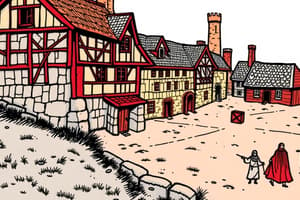Podcast
Questions and Answers
What was the original religion of the Anglo-Saxons?
What was the original religion of the Anglo-Saxons?
- Paganism (correct)
- Islam
- Christianity
- Judaism
What were bards known for?
What were bards known for?
Singing and storytelling
Who was Queen Maeve?
Who was Queen Maeve?
A Celtic heroine with special powers
What did King Alfred's efforts lead to?
What did King Alfred's efforts lead to?
What happened in Ireland in 432?
What happened in Ireland in 432?
What is the main conflict in Beowulf?
What is the main conflict in Beowulf?
What defines an epic hero?
What defines an epic hero?
What is an epic?
What is an epic?
Infallible means __________.
Infallible means __________.
The word 'lavish' means __________.
The word 'lavish' means __________.
The word 'resolute' means __________.
The word 'resolute' means __________.
To 'assail' means to __________.
To 'assail' means to __________.
To 'extol' means to __________.
To 'extol' means to __________.
How does Beowulf represent the Anglo-Saxons?
How does Beowulf represent the Anglo-Saxons?
Flashcards are hidden until you start studying
Study Notes
Anglo-Saxon Religion
- Originally pagan, Anglo-Saxons gradually converted to Christianity.
- Practiced polytheism, worshipping multiple gods; their traditions influenced modern English culture and named the days of the week after these gods.
- Pagan temples transitioned into Christian churches as Christianity spread.
Bards/Storytelling
- Bards were essential to Anglo-Saxon culture, celebrated for their singing and storytelling.
- Poetry was valued equally with practical pursuits like hunting and farming, highlighting its cultural significance.
- They frequently sung about their gods and heroic adventures.
Celtic Heroes/Heroines
- Stories featured themes of love, wildlife, and adventure, exemplified by powerful figures such as Queen Maeve.
- Queen Maeve stood out as a symbol of female strength and dominance, possessing extraordinary abilities.
Rise of the English Language
- King Alfred initiated the Anglo-Saxon Chronicle, documenting England's history.
- His efforts helped establish the English language's prominence across Europe.
- The new use of English elevated old monk tales and literary compositions, gaining greater respect in society.
Light from Ireland
- During Europe's struggles, Ireland thrived, largely due to the spread of Christianity initiated by St. Patrick in 432.
- Irish monks were instrumental in founding sanctuaries, contributing to the preservation of knowledge.
Beowulf/Grendel
- "Beowulf" narrates the hero's quest to save a town from the monster Grendel.
- After Beowulf defeats Grendel, he faces Grendel's vengeful mother, ultimately overcoming her as well.
- This epic illustrates themes of heroism, bravery, and the battle against evil.
Epic Hero
- An epic hero exemplifies the values and ideals of their society through their actions and decisions.
- Traits include great strength, moral fortitude, and the ability to inspire others.
Epic
- Defined as a grand-scale quest story, often involving heroic deeds and important cultural narratives.
Vocabulary Terms
- Resolute: Marked by determination and firmness in purpose.
- Vehemently: Characterized by intense force or violent emotion.
- Infallible: Describes someone or something incapable of making mistakes or being wrong.
- Furled: Refers to something that is rolled up tightly.
- Lavish: Represents something that is extravagant or excessive in richness.
- Assail: Means to attack or confront aggressively.
- Extolled: Refers to being praised or acclaimed highly.
Beowulf as an Anglo-Saxon Symbol
- "Beowulf" embodies the Anglo-Saxon experience, reflecting their values and struggles.
- Grendel symbolizes the external threats faced by the Anglo-Saxons, illustrating the invasions and conflicts of the era.
Studying That Suits You
Use AI to generate personalized quizzes and flashcards to suit your learning preferences.




